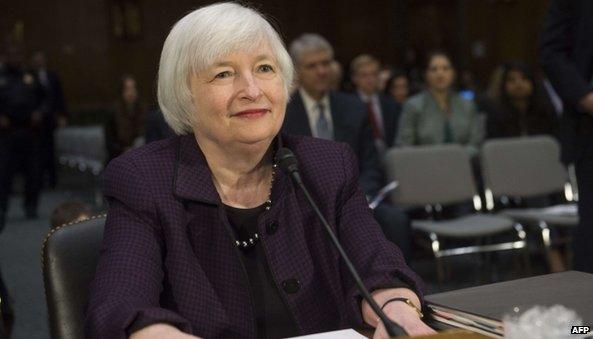Janet Yellen says Federal Reserve flexible on rate rise
- Published

Janet Yellen is scheduled to give testimony in front of Congress on Tuesday and Wednesday
Janet Yellen has said the Federal Reserve can be flexible in deciding when to raise interest rates, which have been near zero since 2008.
The Fed's chief said that while the US economy was improving, the US employment situation was still fragile.
"Too many Americans remain unemployed or underemployed... wage growth is still sluggish," she said, external.
Her comments helped propel US shares to fresh highs - the Dow and S&P 500 both closed at records.
Investors are not eager for the Fed to begin tightening anytime soon and a rate rise before June seems unlikely, as Ms Yellen also warned of weaknesses abroad.
In her semi-annual testimony in Congress she said: "Foreign economic developments, however, could pose risks to the outlook for US economic growth," she told Congress, focusing specifically on a slowdown in China as well as the struggling eurozone.
But she added that efforts to stimulate growth in the eurozone could ultimately help the US economy, and she noted that declining oil prices could provide a boost to US economic output.
'Strongly oppose'
This is Ms Yellen's first testimony in front of a Congress that is controlled by a majority of the Republican party.
Many Republicans have questioned the Federal Reserve's choices in the wake of the financial crisis, including presidential hopeful Rand Paul.
In response to questions from US Senator Sherrod Brown, a Democrat from Ohio, Ms Yellen condemned a bill in Congress that would "audit" the Fed - a move that is seen as strongly political, as the Federal Reserve is already audited by accounting firm Deloitte.
"I strongly oppose 'Audit the Fed,'" she replied, adding: "'Audit the Fed' is a bill that would politicise monetary policy."